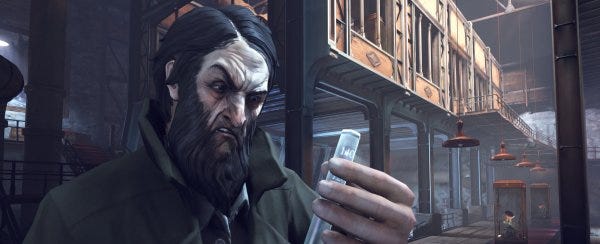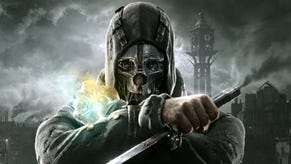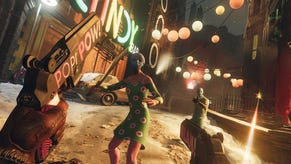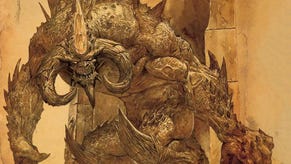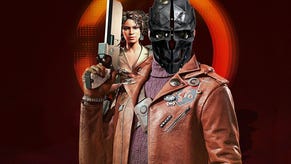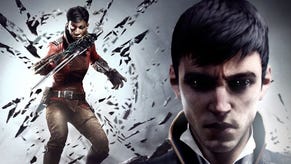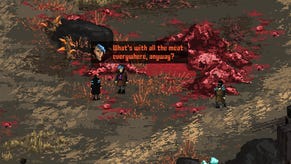From The Shadows: Hands On With Dishonored
Searching For Gold
So I got my hands on Dishonored - Arkane's first-person game of magical stealth and supernatural assassination - and had some time to play through the level shown at E3, Kaldwin's Bridge.
It's quite good.
Actually, that's unfair. It's better than quite good. And it's making me yearn.
Preview events seem simple enough. The journalist - that's me - goes along, plays a fragment of the unreleased title, and writes up some impressions. But sometimes the piece of the game he saw wasn't actually representative of the final game, and other times it's not presented in the right way. That means the preview can come out all wonky. Words in the wrong place, sentences back to front, that sort of thing.
Worse than that, if you've basically engineered your entire life to spend as much time basking in the light of videogames as humanly possible, as I have, then there's a chance that seeing a chunk of the game out of context will spoil your experience with the full thing later on. That happens quite a bit.

But then there's another aspect to it, which is the time spent with a game that tantalises and frustrates more than it informs. My time with Dishonored was brief, and there's a chance I didn't get enough of it down to really consider it properly. There's also a chance that something in what I played might detract from my final playthrough (although I sense not), but the real issue is that I need more.
I need to know.
Now I don't want to just slice open the belly of the hype-beast and allow its golden guts to pour forth into the internet, so let's bleed that excitement out more slowly. I want more, because I just don't know whether what I saw was really what it might be. And it might be that Dishonored is going to be truly great. What I saw in Kaldwin's Bridge was fascinating. But it raised many questions. And I need them to be answered. I yearn for them to be answered.
Dishonored is a game of infiltration and exfiltration. An action game. Some folk seem to have confused it with an RPG. There are choices in there, and dialogue decisions, yes, but this is an action game.

The level I played saw me overpowering a government official from his laboratory high on a building above the lavish pseudo-London cityscape, and lugging him out to a riverside rendezvous. Initially I went in through the front door, bluntly killing the guards with a knife and sneaking inside. But I could have used all manner of other entrances, and other powers. I could have slipped in undetected by distracting the guards. I could have possessed a rat - zooming into the hapless thing in a manner of bodily possession/transformation reminiscent of forgotten FPS Requiem: Avenging Angel - and then rematerialsed once I'd run in through grates and rat holes. I could have possessed an NPC and used the meatsuit to pass through the energy-field barricades. Or I could even have employed a short-ranged teleportation power, blink, and leapt and mantled my way up across the rooftops.
Yeah, Dishonored poses all sorts of questions, such as: what if free-runners could also teleport short distances, and wanted to kill you with rats? What then?
Such thoughts aside, the range of powers is interesting, and even disconcerting. This is because they don't seem to be drawn from the predictable spectrum of things we might be given to expect from games - invisibility or telekinesis, for example - but rather there are some of those familiar FPS powers peppered with weirdness. You can slow time, which is extraordinarily powerful for both stealth and combat, but you can also summon rats to devour people (right down to their twitching bones, which is horrid.) You can use a commonplace (to videogames) sleep dart, but can also access an unlikely wind-blast power to knock projectiles back at your enemies. There's possession, and surprisingly good (if simplified to attack/parry) hand-to-hand combat. It's a strange, mixed palette of devices, which I imagine will be explained in the somewhat baroque backstory that frames the Dishonored world. But how, exactly? I want to know.

Anyway, what became clear quite quickly was that although violence is certainly not going to be too much of a challenge at the easier difficulty settings, the game is firmly weighted towards the player who sneaks. The question this raised, then, was what challenges the game would pose for the stealthy player? If there are always enough routes into a level, if I always stick to a dark corner - will there be a torch shone there? And will the game be able to keep up its adherence to the gospel of crouched hiding, or am I going to be dragged out of the shadows to fight it out for those climactic moments where the super-villain's base is exploding? How that's handled will be critical stuff.
Then there's the question of how good it looks. The visual design is impeccable, with a distinct sense of style, as well as some remarkable atmospherics. The influences are unmistakable, but since what we've seen so far is the Xbox-tuned material, is it going to look any better on PC? And are those levels going to be able to expand far beyond what we saw on Kaldwin's Bridge? As tight an experience as it is, and as beautiful as that fragment of city was to sneak through, is that as big as a level will be? They'll vary in size, sure, but will anything really breath-take with its scale, or are we again tied up by the Xbox's shitty 512mb of memory?
And what of what lies between the levels? I understand that there's a pub and shop hub, which the player returns to between missions to spend the gold he's collected, and to procure his next mission. But precisely how will that work? And what inevitable treachery lies in my path? Overall Bethesda are saying the game will take around 12 hours to complete and 28 hours to "explore fully". I can totally believe this, because the level I saw was packed with secrets and hidden paths. There was even one fully old-fashioned secret room, which required finding another clue to access. Thrilling stuff.

So my time with the game did answer a few questions, such as what games the team were playing (and even working on) over the past few years. Visually it's a meeting of Rapture and City 17 (not least thanks to the involvement of fantasy-skyline maestro Viktor Antonov), but with a distinct regency-punk bent of its own. It's such a strong style that it stands out from screenshots, but it's really in motion that the game's most distinct moments set it apart. The flurry of ash from a guard being disintegrated in a forcefield, the spring-razor effect that takes a man's head off. Gruesome, and gruesomely beautiful. Dishonored is going to be one of the most beautiful games of 2012, no doubt.
Yes, you can taste all the artistic influences like those elements that wine connoisseurs claim to be able to detect in wine. There the smoky aroma of the kinetic melee of Dark Messiah. There's that earthy hint of Thief in the movement and stealth action (throwing objects to distract guards). Perhaps more than a hint, actually. This feels a lot like Thief-with-a-knife. It's like a sort of magical-ninja extension to the Thief games. It's almost as if that idea - the first-person stealth game - didn't basically grind to a halt after Deadly Shadows. Then there's a hint of Bioshock (especially 2) with dual wielding of weird weapons and magical powers in close-up combat. Finally we get an aftertaste of the oppressive sense of over-arching threat in the beleaguered, diseased city from well, a bunch of games, but Deus Ex and Half-Life 2 met to conspire in an alleyway here, and their odour is all around. It wears its influences on it sleeve, and does so in a brave, educated fashion.

Due to its proximity in time, however, Deus Ex: Human Revolution is going to be the most obvious comparison for this game. They share much: the alternative routes through levels, the possibility for grotesque overkill or muted non-lethality, the focus on stealth and on magical technology (literally-speaking, in Dishonored's case.) There are crucial differences, too, of course: this feels much more colourful, imaginative and alive when compared to DXHR's gritty cyberpunk drab 'n gold. But the most important connection between these games is that they also share a crucial constraint: the aforementioned memory limit of industry-alpha machine, the ageing Xbox 360. Both games exhibit signs of the limitations that imposes, despite both operating at the edge of what is possible from games right now. That will not stop it from being a great game, of course - technical limitations seldom do that - but it does draw a line beyond which the game cannot cross. A line that our hefty gaming PC waits patiently the other side of.
In the narrow world of stealth games, both Dishonored and DXHR have - or had - the potential to breach the dusty vault of all-time greatness, and remain there for the foreseeable future. But I believe it's Dishonored, rather than DXHR, which will come closest to being one of those games that the deeper past of gaming promised us: the future pointed to by Thief and Deus Ex. It could be the kind of game that so much else that went before seemed to suggest was inevitable, and yet never seemed to happen. But I haven't played enough.
I just don't know if it's there yet.
Perhaps it'll miss the mark.
I hope not.
We'll find out in October.
